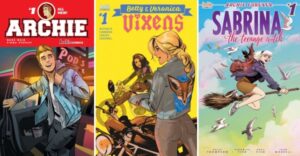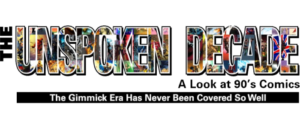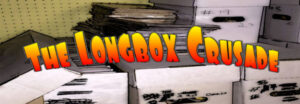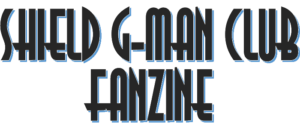PUBLIC DOMAIN AND THE COMICS
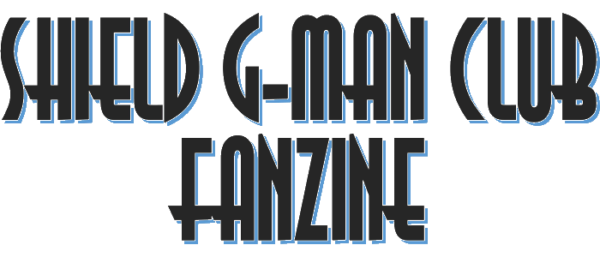
by Lance Jones
OF COURSE, WE START WITH THE ORIGIN STORY….
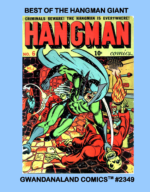 ….because you have to have an origin story! There are no radioactive spiders or Tibetan monks in this one, but it does result in unintended powers!
….because you have to have an origin story! There are no radioactive spiders or Tibetan monks in this one, but it does result in unintended powers!
I tell people that I am an “accidental reprinter.” I never envisioned that I would be doing this years later, or that I would be at it 60 hours a week, let alone make a living at it and use it as my retirement plan. One day I was surfing the Web – I don’t even remember why – and I happened across a Webpage which included a Steve Ditko comic story and the notation that it was public domain. I had previously published a dozen books under a pen name and a few reprints of public domain (non-comic) books; so, I thought: I should publish this, then I’ll have 13 books out instead of 12! That was my only goal at the time. I downloaded the pages, laid out a book, submitted to the precursor of AmazonKDP, and that was that.
 Then someone ordered a copy. I checked to see if other public domain comics were available, and found that there were tens of thousands. Some were being reprinted here and there, but nothing large scale, and very few collections. I did another book, someone bought a copy; I did another book, and not long after someone bought a copy. My obsession had begun. Now, three years later, with about 2,500 collections published and a request list that is over 500 books waiting to be created, I will be laying out and publishing comic reprints for at least six months after I die.
Then someone ordered a copy. I checked to see if other public domain comics were available, and found that there were tens of thousands. Some were being reprinted here and there, but nothing large scale, and very few collections. I did another book, someone bought a copy; I did another book, and not long after someone bought a copy. My obsession had begun. Now, three years later, with about 2,500 collections published and a request list that is over 500 books waiting to be created, I will be laying out and publishing comic reprints for at least six months after I die.
WHAT IS PUBLIC DOMAIN…..REALLY?
The purpose of copyright is to allow the creator of an original work to enjoy exclusive benefits to that work for a period of time. Like a patent, eventually, the creator will lose those exclusive rights, because without eventually turning those rights over to the world, societal growth will be slowed. The concentration of creativity, control, power in any one place for too long is disruptive to progress, so copyright was designed to be temporary. In recent decades that exclusivity has been greatly expanded; today if you create something you have copyright for your entire life (and then some), but for most of the 20th Century, copyright was an initial term of 28 years, with a renewal in the 28th year that would give the copyright holder and additional 47 years (later expanded to 67 years) – – at most, 95 years.
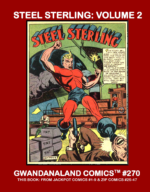 PUBLIC DOMAIN occurs when a copyright is either invalid or when it expires because the renewal was not registered or the entire term as lapsed. In most cases, comics are public domain because their renewal never took place in the 28th year. That’s the key — a renewal could be done early or late, but had to be done in the 28th year; if you published a book in 1949, you had to renew it in 1977, or you lose that copyright. All publications between 1924-1963 had to be renewed, but many comic companies were out of business and there was no one around to renew them. Fiction House had a large line of amazing comics and characters, but since they were out of business in 1955, when the renewals of Golden Age material were due in the late 1960s, there was no one in the office to do it. In other cases, renewals were not registered by companies because they just forgot, or because they didn’t consider comics to be worth the time and effort. THE SHIELD not only belonged to a still-functioning comic company, Archie Comics (previously M.L.J. Publications), but Archie had even published some new stories featuring THE SHIELD in the 1960s. Still, when those renewals for the 1940s comics were due….. oops, someone neglected to do it! Often we don’t know why, but it would surprise many people to learn that over 85% of publications originally copyrighted before 1964 are public domain!
PUBLIC DOMAIN occurs when a copyright is either invalid or when it expires because the renewal was not registered or the entire term as lapsed. In most cases, comics are public domain because their renewal never took place in the 28th year. That’s the key — a renewal could be done early or late, but had to be done in the 28th year; if you published a book in 1949, you had to renew it in 1977, or you lose that copyright. All publications between 1924-1963 had to be renewed, but many comic companies were out of business and there was no one around to renew them. Fiction House had a large line of amazing comics and characters, but since they were out of business in 1955, when the renewals of Golden Age material were due in the late 1960s, there was no one in the office to do it. In other cases, renewals were not registered by companies because they just forgot, or because they didn’t consider comics to be worth the time and effort. THE SHIELD not only belonged to a still-functioning comic company, Archie Comics (previously M.L.J. Publications), but Archie had even published some new stories featuring THE SHIELD in the 1960s. Still, when those renewals for the 1940s comics were due….. oops, someone neglected to do it! Often we don’t know why, but it would surprise many people to learn that over 85% of publications originally copyrighted before 1964 are public domain!
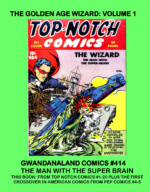 The most exciting news is that public domain does not mean that no one owns it; it means that EVERYONE owns it. You own it, I own it, the little old lady down the street owns it. Take, for example, the SHIELD stories in PEP COMICS; you own those stories. You can do whatever you want with them. You can reprint the stories, you can make Christmas cards out of them, make calendars, posters for your walls, sell them as campaign buttons, or tattoo them on your butt. They are yours. No one has exclusivity to them, and just because someone uses it doesn’t mean you can’t use it too.
The most exciting news is that public domain does not mean that no one owns it; it means that EVERYONE owns it. You own it, I own it, the little old lady down the street owns it. Take, for example, the SHIELD stories in PEP COMICS; you own those stories. You can do whatever you want with them. You can reprint the stories, you can make Christmas cards out of them, make calendars, posters for your walls, sell them as campaign buttons, or tattoo them on your butt. They are yours. No one has exclusivity to them, and just because someone uses it doesn’t mean you can’t use it too.
I have had more than a few people ask me, “Do you think you have the right to make money off the work of others?” I always answer the same way – “Yes, the same way you do and everyone else in the country does. We all own it!” And when you think about it, that’s what public domain is for – to ensure that the creative works don’t die out, forgotten, lost to the mists of time.
HOW DO I KNOW IF SOMETHING IS PUBLIC DOMAIN?
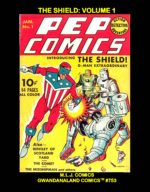 Before the Internet was invented by Al Gore or Obi-Wan Kenobi, knowing what was public domain was extremely difficult; you had to visit the Library of Congress and check their database, or you had to pay them to do a copyright search for you. This was time-consuming and expensive. Today you can check with 99%+ accuracy using online sources. The University of Pennsylvania Libraries has the best information:
Before the Internet was invented by Al Gore or Obi-Wan Kenobi, knowing what was public domain was extremely difficult; you had to visit the Library of Congress and check their database, or you had to pay them to do a copyright search for you. This was time-consuming and expensive. Today you can check with 99%+ accuracy using online sources. The University of Pennsylvania Libraries has the best information:
https://onlinebooks.library.upenn.edu/cce/
For all books published and copyrighted from 1950-forward, you can check renewals using the Library of Congress online database, which is close to 100% accurate. For books which were published before 1950, you have more work to do – checking the Periodicals lists and the Contributions to Periodicals lists for each year that would apply. For example, if you are checking on a book that was published in 1947, you would have to check not only the three separate lists for 1975 (the official renewal year) but also 1974 and 1976 in case they were recorded a little bit late or placed in an earlier list, just to be safe; a minimum of nine lists. It can be a lot of work in some cases, and the pre-1950 lists may contain typographical errors that can frustrate your search, which is why I cannot say that it is 100% accurate. But don’t give up, and if you have any questions, Gwandanaland Comics will help!
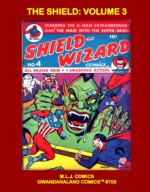 This is just the tip of the copyright-information iceberg, of course. Copyright and public domain are not complex, once you know the laws that apply to the year that the publications you’re checking; but it can be time-consuming. We have made errors and had to correct them. Like anything else, you learn as you go, and you never know it all, but the wealth of comic material in the public domain runs over two million pages, easily, so knowledge really is power!
This is just the tip of the copyright-information iceberg, of course. Copyright and public domain are not complex, once you know the laws that apply to the year that the publications you’re checking; but it can be time-consuming. We have made errors and had to correct them. Like anything else, you learn as you go, and you never know it all, but the wealth of comic material in the public domain runs over two million pages, easily, so knowledge really is power!
If you want to do some comic reprint projects, and we can offer any help, just holler. I don’t consider anyone competition, because I will never be able to complete all the material I want to do – there is more than enough to go around, and what you offer will be different from what I offer, even if it is based on the same material.
GWANDANALAND COMICS
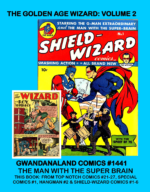 Gwandanaland Comics came into being accidentally, but the name was very purposeful. I wanted a name that, when plugged into the Amazon search bar, only my books would come up – so I had to invent a name. “Gwandanaland” is a bastardization of the ancient lass mass of prehistory called Gondwanaland. By making it different, I created a trademark that has served me well; probably the best business decision I ever made.
Gwandanaland Comics came into being accidentally, but the name was very purposeful. I wanted a name that, when plugged into the Amazon search bar, only my books would come up – so I had to invent a name. “Gwandanaland” is a bastardization of the ancient lass mass of prehistory called Gondwanaland. By making it different, I created a trademark that has served me well; probably the best business decision I ever made.
On a given day I will create 1-2 new collections and update 1-2 books previously published. We’re always looking to replace low-quality pages, find stories or issues we were missing, and just make the books look better. Thankfully, the available pages for THE SHIELD are above average, so they already make very beautiful books, but even those may be upgraded as new material is found. We use online sources for files (Comic Book Plus and Digital Comic Museum are two big sources), but we also get scans from readers and loyal readers send me books to scan.
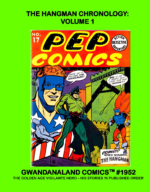 Gwandanaland is not just a publisher and bookseller; we are a living, breathing, growing and maturing embodiment of public domain comics history. Consider how few Golden Age comics were available to read before 10-12 years ago; thousands of books were only available online. Now, with the advent of print-on-demand (POD) publishing, books can be created with no initial investment, no overhead. Before POD a publisher had to believe he could sell hundreds or thousands of copies in order to create a book and pay for a print run; now there is not print run! A book is printed when it is ordered, so even the book that only sells a couple of copies can see the light of day. Gwandanaland Comics is a business, and I want to make money, but almost as important is to ensure that the history of comics is not limited to a handful of reference works — the stories can still be out there, and you can hold them in your hands for less than $50,000!
Gwandanaland is not just a publisher and bookseller; we are a living, breathing, growing and maturing embodiment of public domain comics history. Consider how few Golden Age comics were available to read before 10-12 years ago; thousands of books were only available online. Now, with the advent of print-on-demand (POD) publishing, books can be created with no initial investment, no overhead. Before POD a publisher had to believe he could sell hundreds or thousands of copies in order to create a book and pay for a print run; now there is not print run! A book is printed when it is ordered, so even the book that only sells a couple of copies can see the light of day. Gwandanaland Comics is a business, and I want to make money, but almost as important is to ensure that the history of comics is not limited to a handful of reference works — the stories can still be out there, and you can hold them in your hands for less than $50,000!
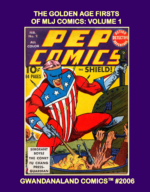 Many readers ask how I decide what books to make next since there are so many available. In the beginning, it was just a matter of guessing what I thought people might like. Sometimes I was right, but sometimes I was very wrong because there are a large number of Gwandanaland Books that still have failed to sell a single copy! That’s one of the reasons I must work hard to put out so many books; although there are some exceptions, the average title only sells a couple of copies each year – we’re an avid group, but relatively small, and the books are not cheap to buy. For the last year or so, however, choosing a book is easy because as Gwandanalanders began requesting collections, characters, concepts, I just started making what readers wanted. I have a list (over 500 long and growing!), and if more than one person requests a book, it moves up the list. If three people ask for it, it moves to the top. My choices are much easier because you tell me what to do.
Many readers ask how I decide what books to make next since there are so many available. In the beginning, it was just a matter of guessing what I thought people might like. Sometimes I was right, but sometimes I was very wrong because there are a large number of Gwandanaland Books that still have failed to sell a single copy! That’s one of the reasons I must work hard to put out so many books; although there are some exceptions, the average title only sells a couple of copies each year – we’re an avid group, but relatively small, and the books are not cheap to buy. For the last year or so, however, choosing a book is easy because as Gwandanalanders began requesting collections, characters, concepts, I just started making what readers wanted. I have a list (over 500 long and growing!), and if more than one person requests a book, it moves up the list. If three people ask for it, it moves to the top. My choices are much easier because you tell me what to do.
 We don’t digitally remaster the books, and only in the most necessary cases do we make any alterations to a page. We’re trying to present these books as close to the original as possible. The modern remastered books are certainly attractive, and present flawless white pages with bright colors, but if we went down that road the books would lose their authenticity, and the prices would skyrocket. Our books are imperfect but authentic.
We don’t digitally remaster the books, and only in the most necessary cases do we make any alterations to a page. We’re trying to present these books as close to the original as possible. The modern remastered books are certainly attractive, and present flawless white pages with bright colors, but if we went down that road the books would lose their authenticity, and the prices would skyrocket. Our books are imperfect but authentic.
All our books are available on Amazon – they are our producer and sales outlet, and while I wish we were not part of that evil empire, without them this would not exist. Just plug “Gwandanaland” and any other keyword you want into the search bar, and the books will show up. We have a spreadsheet catalog/list which we update monthly, and it can guide you to what you want; just send us a message on Facebook or an email to gwandanaland@yahoo.com. We have an official Facebook page (Gwandanaland Comics, of course) and there is a fan-operated page FOG Fans Of Gwandanaland where readers share their experiences and opinions.
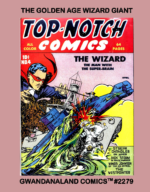 Most importantly, if you have any questions about our books, or if you want us to make a special book for you, write, message, email, use smoke signals, or yell out the window. We want to make it for you! If it is legal and possible, we’ll do it. Indulge your fantasies! Are there specific SHIELD stories you’d like to see in a book, or a special character, series, artist, writer, topic, anything you want – that’s why we exist!
Most importantly, if you have any questions about our books, or if you want us to make a special book for you, write, message, email, use smoke signals, or yell out the window. We want to make it for you! If it is legal and possible, we’ll do it. Indulge your fantasies! Are there specific SHIELD stories you’d like to see in a book, or a special character, series, artist, writer, topic, anything you want – that’s why we exist!
Lance Jones
Gwandanaland Comics
Box 195
Copper City MI 49917
gwandanaland@yahoo.com
COPYRIGHT
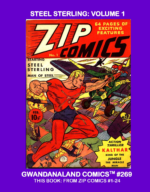 This is a brief summary of copyright rules and how they apply to public domain. If a book was first published in another country, the laws of that country will apply. Everything is based on the time and place of first publication, so this is based on books that had a US-first publication.
This is a brief summary of copyright rules and how they apply to public domain. If a book was first published in another country, the laws of that country will apply. Everything is based on the time and place of first publication, so this is based on books that had a US-first publication.
1923 and Before — It is public domain because all renewals have expired.
1924-1963 — If published with a proper copyright notice, and registered with the Copyright Office, it had to be renewed in the 28th year to remain protected. If it was renewed it is not public domain; if it wasn’t it is public domain. Although some companies were very diligent about renewals, some weren’t and there are exceptions to almost every company. If it was not registered, it is public domain.
1963-1977 — If published with a proper copyright notice, it has automatic renewal and will not be public domain until at least 2058. If it did not have a proper copyright notice, then it is public domain. Although it is wholly dependent on the publisher, most people would be surprised to find that about 85% of publications from 1924-1963 were NOT renewed!
A PROPER COPYRIGHT NOTICE THROUGH 1977 MUST CONTAIN THREE ELEMENTS:
1. The word “copyright” or the © symbol;
2. The name of the copyright holder;
3. The year of publication.
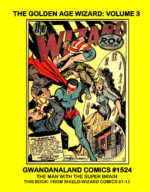 These three elements don’t have to be continuous, but they usually are. They must be in a conspicuous place, however. If they are not included or are not in a conspicuous place, the publication is automatically public domain.
These three elements don’t have to be continuous, but they usually are. They must be in a conspicuous place, however. If they are not included or are not in a conspicuous place, the publication is automatically public domain.
1978-1988 — If published with a proper copyright notice, OR registered with the copyright office within five years, it is protected. If not, public domain.
1989-ON — No registration or copyright notice is required. If you create it, you own the copyright. If you spit on a napkin, that’s your creation. If you doodle on the cuff of your shirt, it’s yours.
WHAT IS AN ORPHAN BOOK? – This is a book which is under copyright but the rights-holder no longer exists – that is, the company is gone and no one holds its assets, or the rights-holder died without heirs. The books are technically not public domain, but there is literally no one to claim the rights. Opinions differ on whether an orphan should be considered public domain; I believe that if it is a true orphan – that is, if you are confident that no one is around who owns those rights – then you should consider it public domain. Others may disagree, and it can be very hard to know for sure whether those rights still belong to someone, so tread lightly.
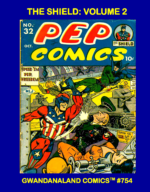 IT SAYS “ALL RIGHTS RESERVED”; IS THAT THE SAME THING? – This does NOT take the place of a proper copyright notice; it has no legal force and hasn’t since the 1920s. In the early 1970s, Skywald Publishing failed to include a proper copyright notice in their B&W horror magazines, making those books public domain. They included the phrases “All Rights Reserved” and “Nothing can be reprinted in any form without the express permission of the publisher,” but those phrases have no legal standing. They are meaningless without a proper copyright notice. In another book, they had the copyright symbol, the name of the publisher, but nowhere in or on the book was there any publication date – so it is public domain. Copyright can be unforgiving prior to 1978!
IT SAYS “ALL RIGHTS RESERVED”; IS THAT THE SAME THING? – This does NOT take the place of a proper copyright notice; it has no legal force and hasn’t since the 1920s. In the early 1970s, Skywald Publishing failed to include a proper copyright notice in their B&W horror magazines, making those books public domain. They included the phrases “All Rights Reserved” and “Nothing can be reprinted in any form without the express permission of the publisher,” but those phrases have no legal standing. They are meaningless without a proper copyright notice. In another book, they had the copyright symbol, the name of the publisher, but nowhere in or on the book was there any publication date – so it is public domain. Copyright can be unforgiving prior to 1978!
COPYRIGHT IS NOT TRADEMARK
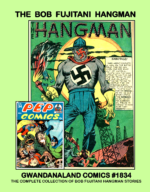 A copyright is any creative work. A trademark is a symbol, word, or words legally registered or established by use as representing a company or product. Many readers are confused about these differences. Copyright has very few gray areas; while the copyright laws have changed and can be detailed they are intended to be cut-and-dried. Trademarks can be a gray area and have often resulted in lawsuits and other disagreements because what seems obvious to one person is not so obvious to another. Trademarks are names, logos, designs, character appearance, and traits, or other items which differentiate one business from another. When someone produces a knock-off of a Nike shoes design or a Louis Vitton purse they are violating trademark laws. Recently the SHAZAM movie appeared, and while we all know that he is the Golden Age Captain Marvel, Marvel Comics owns the trademark to the name Captain Marvel. At Gwandanaland we have published books containing public domain material of Archie, Betty and Veronica, and even the Mighty Crusaders, but Archie Comics owns the trademarks to those characters, so we could not feature certain elements on the cover or in our print marketing. I know a lot less about trademark than I do about copyright, but if you have any questions I will help as much as I can.
A copyright is any creative work. A trademark is a symbol, word, or words legally registered or established by use as representing a company or product. Many readers are confused about these differences. Copyright has very few gray areas; while the copyright laws have changed and can be detailed they are intended to be cut-and-dried. Trademarks can be a gray area and have often resulted in lawsuits and other disagreements because what seems obvious to one person is not so obvious to another. Trademarks are names, logos, designs, character appearance, and traits, or other items which differentiate one business from another. When someone produces a knock-off of a Nike shoes design or a Louis Vitton purse they are violating trademark laws. Recently the SHAZAM movie appeared, and while we all know that he is the Golden Age Captain Marvel, Marvel Comics owns the trademark to the name Captain Marvel. At Gwandanaland we have published books containing public domain material of Archie, Betty and Veronica, and even the Mighty Crusaders, but Archie Comics owns the trademarks to those characters, so we could not feature certain elements on the cover or in our print marketing. I know a lot less about trademark than I do about copyright, but if you have any questions I will help as much as I can.
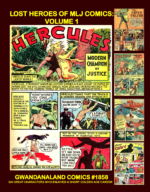 It is not necessary to register a trademark for it to be legally valid, though it certainly helps in the case of conflicts. Even though we publish public domain materials, and you can use the pages and images in any manner you choose (since we all own them) the name Gwandanaland is our trademark so that I do own myself. The SHIELD stories from the 1940s are public domain; whether the character name and design are trademarks of the Archie Comics I don’t know. Trademarks can be lost through non-use, while copyrights are defined only by the law.
It is not necessary to register a trademark for it to be legally valid, though it certainly helps in the case of conflicts. Even though we publish public domain materials, and you can use the pages and images in any manner you choose (since we all own them) the name Gwandanaland is our trademark so that I do own myself. The SHIELD stories from the 1940s are public domain; whether the character name and design are trademarks of the Archie Comics I don’t know. Trademarks can be lost through non-use, while copyrights are defined only by the law.
You shouldn’t use this brief overview as the only reference. I’m just trying to show you that it’s not too complex to navigate and that it is possible to learn what is public domain and what is not. I am not an expert; I know a little bit more than the guy on the street, but only because of the guy on the

